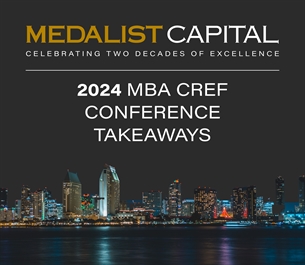
2024 MBA CREF Conference Takeaways
Medalist Capital recently returned from this year’s MBA - Commercial Real Estate Finance Conference in San Diego. Consistently originating $1.1+ billion over 105+ transactions with 40+ different lenders in each of the last six years means we are hustling to ensure we find the best execution. It also means we must efficiently cover a lot of ground at this annual event, where many of our capital sources convene to share production accomplishments from the prior year as well as their allocations for the current year. All five of our offices were represented as we sent 10 people out to divide and conquer 57 separate meetings spread over two and a half days consisting of daily meals, receptions, and back-to-back 30-minute meetings. Our newest member Ian Anderson was included in this team, who will be expanding our footprint into the Nashville market. He hit the ground running with his first day on the job, which started with a Super Bowl party and 200 attendees from our various capital sources.
On the first day we noticed attendance was lighter, which was a refreshing change to the hustle and bustle of the recent years past with over-crowded hotel lobbies, elevators, and restaurants. We learned that average loan origination volume was off by 40 percent in 2023; however, there were multiple lenders who we met with that capitalized on the void left by other capital sources (mostly banks) and were able to exceed production volumes from the prior year. Either way, we walked away from meetings with an optimistic view where our lenders expect 2024 will be a better year. Activity picked up noticeably in the fourth quarter and carried over into the New Year.
There is still plenty of liquidity in the market, but many lenders will still be debt service coverage constrained. Pricing is competitive and relatively stable; however, maximum leverage will likely remain at 65 percent. Prepayment flexibility continues to be more prevalent, with some lenders even including it in their par pricing but are willing to offer a discount for borrowers that are comfortable with full term yield maintenance.
Several lenders continue to hold the line with the more conservative CM1 metrics which generally limit loan proceeds to a 1.50x DSCR with a 25-year amortization. We did meet with others that are accepting more risk and using CM2/ 1.25 DSCR to get more yield. Other capital providers are offering completely new product lines for Construction Financing and Shorter-Term Bridge financing for value-add deals. Speaking of shorter duration, there remains a high demand for short term money, and many lenders that used to not offer short term, are trying to carveout more allocation. Generally, there is not enough to last the entire year, so we recommend pursuing it now before it runs out same for the Construction and Bridge programs.
Life Companies are still relative value lenders, which means the mortgage divisions compete with the bond Investors for yield. Over the last 12 months the BBB Corporate Spread Index has fallen 40 basis points from 1.60 to 1.20 while the 10 Year US Treasury yield has risen by the same margin from 3.95 to 4.35. Coincidentally, almost all of the BBB spread compression occurred over this heightened level of mortgage lending activity since Q4 2023, and (no pun intended) should lend itself to a stable mortgage environment in the foreseeable future barring any geo-political disruptions or inflation data surprises.
The tightest spread we saw at the conference was 135 basis points, and there were rumors about others, but they are typically more of a unicorn where the loan acts more like a bond, the LTV is 50 percent (of land value) and the debt self-amortizes over 10 years. Most CM1 pricing seems to currently fall in the 150-175 range, with a few outliers. CM2 is mostly 200-250, and noticeably wider due to the increased risk profile.
The messaging was consistent across the board regarding property types: Multifamily and multi-tenant industrial are still preferred with grocery-anchored retail and high-quality shop space retail also in high demand. Single-tenant and small-bay industrial are also getting a bigger lending audience with the right story (well-located, below market rents, barriers to entry, etc.). More lenders continue to carveout allocation for self-storage, as well as some hotels with the major flags. Office is still a challenge and likely to remain that way until values and leasing activity stabilize. Any office deal that gets done is well-located, typically multi-tenant and 50 percent LTV or less, with a strong operating history and staggered rollover exposure. Credit Tenant Lease financing is also still a viable option across all property types, including Office.
Some people came away feeling like the mood at the 2024 Commercial Real Estate Finance Conference lacked enthusiasm and was perhaps a little subdued, but it was nice to have a little more elbow room in public spaces. We prefer to describe it more with a sense of calm and a return to discussions around lending relationships that we have built since Medalist Capital was established 20 years ago. Some of them go back even further, and with your help we look forward to cultivating them into the future.
As always, we appreciate your trust in Medalist Capital. Please be on the lookout for additional updates from our team members that service your accounts, as we continue to monitor the lending environment and grow our footprint throughout the coming year.
Written by Roger Montague.